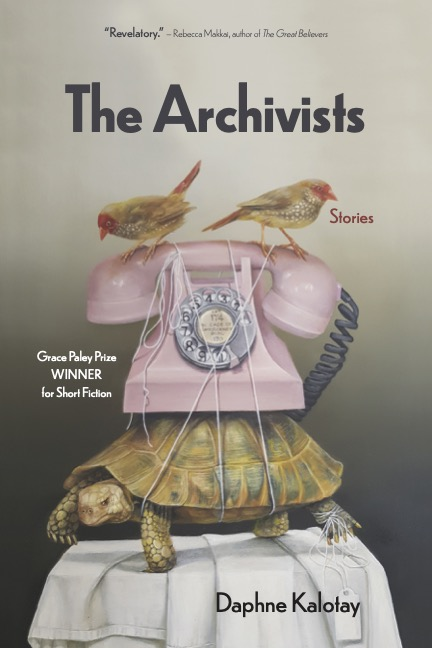The Archivists: Stories by Daphne Kalotay
A hardheaded realist is confronted by both her mortality and a would-be wizard. A thirteen-year-old girl in 1950s Toronto infiltrates the ranks of Bell Canada. A ninety-nine-year-old woman appears to be invincible. A group hikes in Germany while a solitary woman is pursued on a walk in New Mexico. These deeply moving stories ingeniously consider issues of identity, history, and memory and our shared search for meaning in an off-kilter world.
Review: I received an uncorrected proof copy of this from Net Galley in exchange for an honest review.
This beautiful collection of 12 short stories poignantly captures the private calamities of individual life. In these stories we see characters suffering from the generational fallout of the Holocaust, the death of friends and family members, of relationships crumbling, the shifting world after the Covid-19 pandemic, and much more. Loss and navigating life after the death of loved ones is a central pillar of these stories but overall, Kalotay's characters are resilient and persevere.
All of these stories are beautiful in their own way but a few in particular stood out to me. "A Guide to Lesser Divinities" is perhaps the most tongue in cheek humor of the bunch, but still quite a sad tale. In it, college instructor Eliana is navigating grief and her own role in that loss while coming to terms with her feelings for her boyfriend and her job. Her scorn for those that abuse the English language is a highlight of the tale, and I couldn't help but be amused by Eliana's lectures to her students: "learn the difference between can and may, uninterested and disinterested, lay and lie. To deny the accuracy of one versus the other, I explained, was a first step toward moral corrosion. I told them that the degradation of language set the stage for ethical misjudgment, that our careful parsing of word choice and allusion were skills to combat despots and charlatans. That the semicolons they so blithely misused might be the last feeble shims propping up our teetering republic" (61).
In "Providence," 45-year-old Talia has a health scare while jogging that ultimately leads to her realizing the truth of her feelings for neighbor Gordie and of the singular nature of their connection: "She could let down her guard with him, could tell him anything, even her bleak, unattractive thoughts - of accumulated disappointment and small, sharp wounds, of her dubiousness about the world in general. Sometimes she even saw herself as Gordie did: her archaic qualities as exotic quirks, her chunky stereo system as "cool," and her lack of a television or streaming service as "subversive" (95). Talia's is one of the more uplifting stories in the collection and was beautiful in its reveal of a goodness emerging from something scary and bleak.
"Seeing" in which Kristin is stalked by a man while walking on an empty country road was haunting and perfectly captures the fear that I think most women can relate to of being alone and threatened by a male. And "Oblivion," the final story in the book, was yet another haunting tale, of the way Joan worked her way out of poverty and returns home to help her cousin who has slipped into dementia. The final scene of his house, with his voice echoing on the voice machine, gave me such a lonely and deeply sad feeling.
Kalotay has immense range and can beautifully capture grief, loss, mental health issues, and fear that we all inevitably face as humans. Her characters show up in cities all over the globe, with all different life stories but they share a human connection and are deeply relatable. They each contain multitudes. Told in rich, beautiful, haunting language, this was a beautiful collection, with each story somehow more moving and transforming than the last.
Stars: 4
Related Title:



Comments
Post a Comment